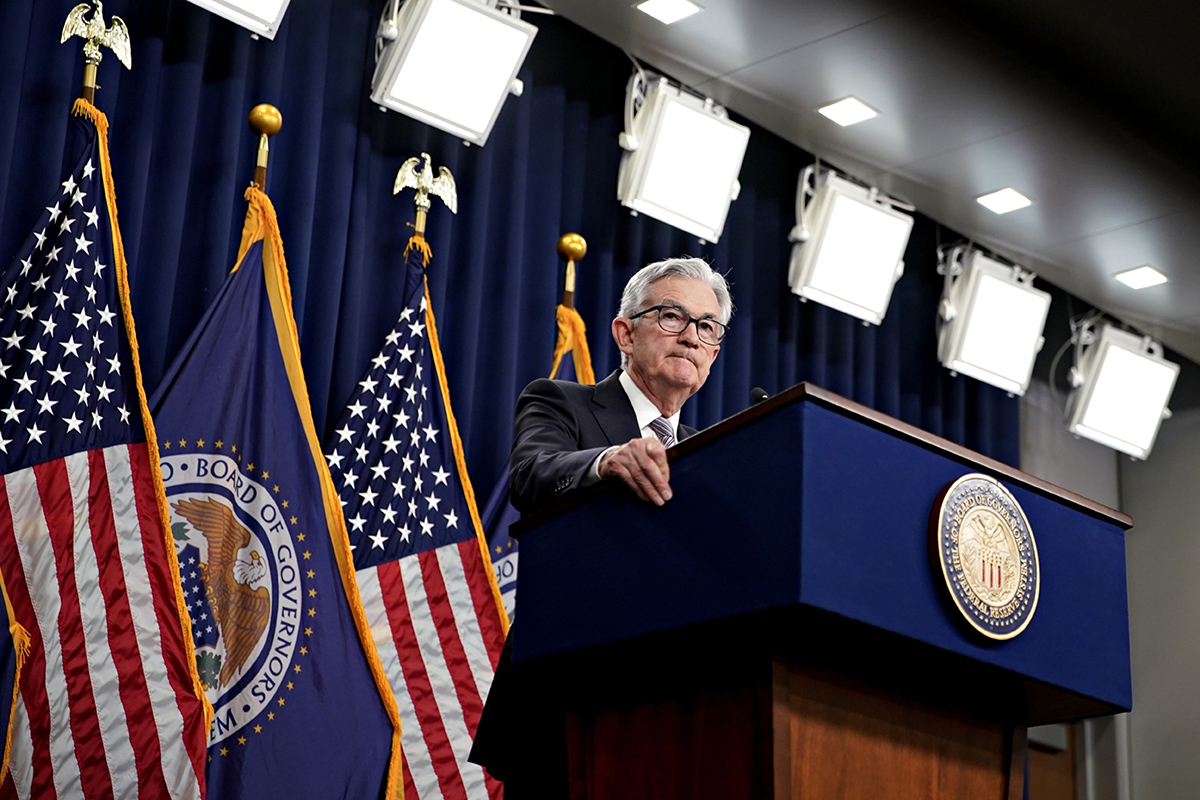 Federal Reserve Chairman Jerome Powell. Photographer: Al Drago/Bloomberg
Federal Reserve Chairman Jerome Powell. Photographer: Al Drago/Bloomberg
Federal Reserve officials paused on Wednesday following 15 months of interest-rate hikes, but they signaled they will likely resume tightening at some point to continue cooling inflation.
"Holding the target range steady at this meeting allows the committee to assess additional information and its implications for monetary policy," the Federal Open Market Committee (FOMC) said in a statement released in Washington Wednesday.
Recommended For You

Policymakers also adjusted the language in their statement, referring to how they would determine "the extent of additional policy firming that may be appropriate," rather than "the extent to which additional policy firming may be appropriate."
The decision left the benchmark federal funds rate in a target range of 5 percent to 5.25 percent. Fresh quarterly Fed forecasts showed borrowing costs rising to 5.6 percent by year end, according to the median projection, compared with 5.1 percent in the previous round of projections.
The FOMC vote was unanimous. Of the 18 policymakers, 12 penciled in rates at or above the median range of 5.5 percent to 5.75 percent, showing that most policymakers agree further tightening is needed to contain price pressures. The forecasts imply officials expect two additional quarter-point rate hikes or one half-point increase before the end of the year.
Chair Jerome Powell said nearly all Fed officials expect it will be appropriate to raise interest rates "somewhat further" in 2023 to bring down inflation. He declined to say whether another hike could come as soon as July, but emphasized that it would be a "live meeting."
"Inflation pressures continue to run high, and the process of getting inflation back down to 2 percent has a long way to go," Powell said at a post-meeting press conference. The committee "judged it prudent" to hold rates steady this month given how quickly rates have risen, he added, saying the pause is a continuation of the moderating pace of policy measures.
"We've covered a lot of ground, and the full effects of our tightening have yet to be felt," the Fed chief said.
The S&P 500 index of stocks declined immediately after the decision. The dollar pared declines against a basket of currencies. Yields on two-year Treasuries surged to the highest since March. Swaps traders lifted where they see the Fed's peak policy rate, up to around 5.34 percent in September.
Wednesday's hold is the first pit stop in the central bank's most aggressive tightening campaign in decades, designed to curb inflation that saw rates lifted from levels near zero starting in March 2022.
Earlier this year, stock and bond markets were roiled and four regional banks collapsed as policymakers raced to catch up after being slow to respond to mounting price pressures. Yet the job market has remained sturdy and the inflation rate is still more than twice the Fed's 2 percent target.
Both Powell and Fed Governor Philip Jefferson—nominated for vice chair by President Joe Biden—signaled they support skipping a rate move in comments before this meeting, arguing they could afford to wait for more data as they assess the evolving outlook.
Other officials, including Fed Governor Christopher Waller, indicated they could go along with a skip but were cautious about calling an end to rate hikes with inflation stubbornly high.
U.S. central bankers are counting on slowing demand and less robust hiring to help temper price pressures, which have run above their 2 percent target for more than two years.
What Bloomberg Economists Say…
"We interpret this dot plot as a jawboning tool—a way for the Fed to preempt further easing in financial conditions in response to its rate pause, even if the additional tightening is unlikely to be fully delivered. … We believe that inflation will likely be lower than these projections by year-end, and ultimately the Fed will hike less than what the new dot plot indicates."
— Anna Wong, Stuart Paul & Eliza Winger, economists
Yet signals on the economic slowdown anticipated by Fed officials are mixed. Consumers in May were less confident about the economy, according to a survey, but their spending picked up in the latest reading for April.
Powell said the labor market remains very tight. Employers added 339,000 to payrolls in May, while job openings remain high, according to recent data.
The inflation rate has declined from last year's peak but is still elevated: Prices rose 4.4 percent for the 12 months through April, according to the personal consumption expenditures (PCE) index, the gauge preferred by the Fed.
A separate measure, the Labor Department's consumer price index (CPI), cooled further in May, and the details showed encouraging signs of a slowdown, according to data out just before Fed officials gathered on Tuesday morning.
Powell said he and his colleagues still think inflation risks are tilted to the upside, though he said the risks of doing too little or too much "are getting closer to being in balance." He suggested rate cuts are probably "a couple of years out" once inflation comes down significantly.
New Projections
At this meeting, Fed officials also updated their economic forecasts. For 2023, the median estimate for gross domestic product (GDP) growth was marked up to 1 percent, from 0.4 percent in March.
Unemployment is forecast to average 4.1 percent in the fourth quarter, compared with 4.5 percent projected in March. The official jobless rate stood at 3.7 percent in May.
The PCE inflation rate was expected to be 3.2 percent this year, down from 3.3 percent projected in March, but the core inflation projections increased.
—With assistance from Vince Golle, Sophie Caronello & Liz Capo McCormick.
© Touchpoint Markets, All Rights Reserved. Request academic re-use from www.copyright.com. All other uses, submit a request to [email protected]. For more inforrmation visit Asset & Logo Licensing.



